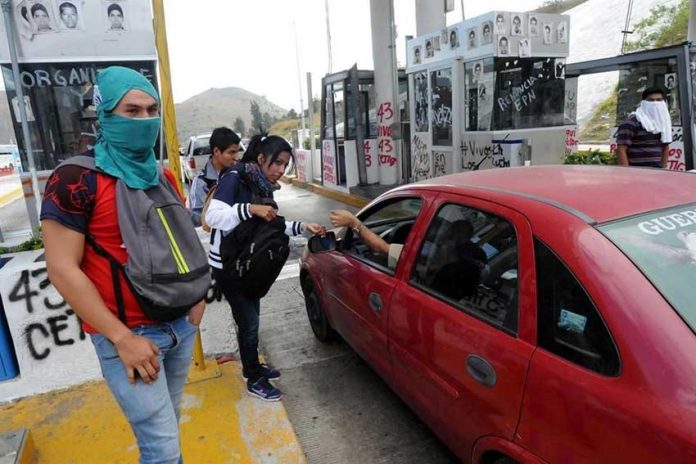Protesters charging motorists a “voluntary fee” at highway toll plazas is a common sight in Mexico and for good reason – the practice can be very profitable.
In less than 15 minutes late last month, early childhood teachers protesting against the elimination of government subsidies for daycare centers collected at least 5,000 pesos (US $263) at the Palo Blanco toll booth on the highway between Chilpancingo and Acapulco in Guerrero, the newspaper Reforma reported.
Their colleagues carried out simultaneous hours-long collections at two other toll plazas on the Autopista del Sol, charging each car 50 pesos (US $2.63) – a small amount that can add up very quickly.
“It’s a [monetary] cooperation that will be used to continue our movement because we often have to travel to Mexico City to participate in protests,” one protester told Reforma.
However, some people doubt that the money collected is used by protesters to further their cause, and there was evidence at last month’s collection in Guerrero to support that view.
“Compañeras [colleagues], we’re all going to get our bit,” a teacher called out as she took another 50-peso contribution from a passing motorist.
A Federal Police officer said he and his colleagues have been unable to do anything to stop the toll plaza takeovers because state authorities advocate dialogue with protesters rather than removal by force.
“The truth is that a lot of organizations have taken over the toll booths to make some money but there are also organizations that don’t ask for a cooperation and allow free passage. They hand out information about their struggle,” he said, adding that whatever amount protesters collect in tolls represents a loss for the federal government.
More evidence that protesters personally profit from their toll collections was presented in the form of a verbal confrontation that almost came to blows at the Palo Blanco toll plaza.
The day before the early childhood teachers’ takeover, students from a physical education college occupied the plaza for three hours and at the end of their “shift,” a heated argument broke out about who would take home the money, Reforma said.
However, a regional leader of CETEG, a Guerrero-based teachers’ union, denied that money collected by protesting teachers goes into their own pockets, stressing that it is used to keep on fighting against injustices.
Taurino Rojas González said that taking over the highway is “very expensive and dangerous” but added that organizations are forced to do it because “the authorities never resolve [their] demands.”
He also said that police have at times used force to remove protesters, recalling that students from the Ayotzinapa Rural Teachers’ College – the same school attended by the 43 students who disappeared in Iguala in 2014 – were shot at on the Autopista del Sol in 2011 and two young men were killed.
Despite the dangers, the occupation of toll plazas continues to be a popular – and lucrative – way to protest.
Protesters including farmers and teachers took over highway toll booths at 13 locations in eight states last Friday to ask for contributions that in some cases, motorists had no choice but to pay.
Source: Reforma (sp)
